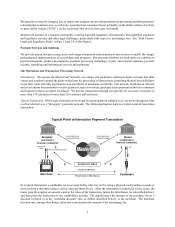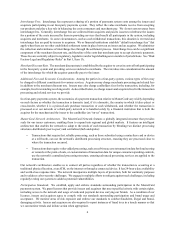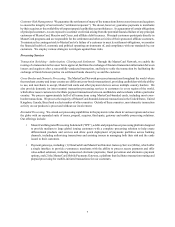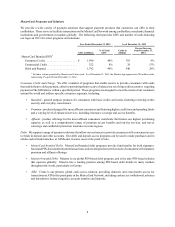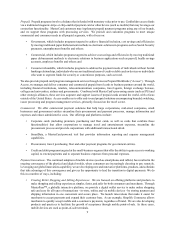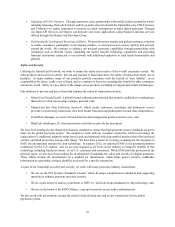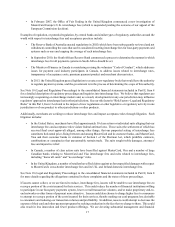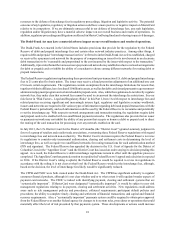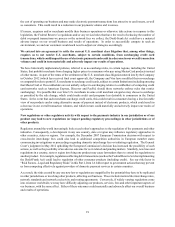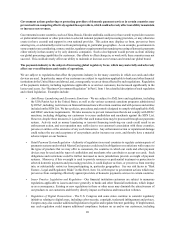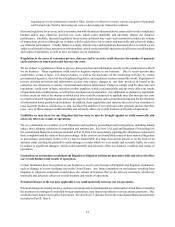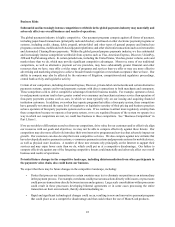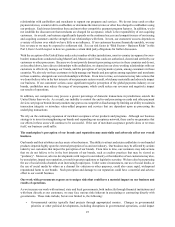MasterCard 2013 Annual Report Download - page 19
Download and view the complete annual report
Please find page 19 of the 2013 MasterCard annual report below. You can navigate through the pages in the report by either clicking on the pages listed below, or by using the keyword search tool below to find specific information within the annual report.15
Consumer Financial Protection Bureau and Financial Stability Oversight Council. The Consumer Financial Protection
Bureau (the “CFPB”) has significant authority to regulate consumer financial products in the United States, including
consumer credit, deposit, payment, and similar products. In addition, the Financial Stability Oversight Council
(“FSOC”) is tasked with, among other things, identifying payment, clearing and settlement systems in the United States
that are “systemically important” under the applicable statutory standard. Such systems will be subject to new regulation,
supervision and examination requirements. It is not entirely clear whether and/or to what extent the CFPB will regulate
broader aspects of payment card network operations, and to date, MasterCard has not been designated “systemically
important.” See our risk factor in "Risk Factors - Legal and Regulatory Risks" in Part I, Item 1A related to the Dodd-
Frank Act.
Retail Payments System Regulation. Regulators in several countries around the world either have, or are seeking to
establish, authority to regulate certain aspects of the payments systems in their countries. Such authority could result
in regulation of various aspects of our business. Payment system oversight also could be used to provide resources or
preferential treatment or other protection to selected domestic payments and processing providers, such as in Russia
and Ukraine. See our risk factor in "Risk Factors - Legal and Regulatory Risks" in Part I, Item 1A related to government
actions that may prevent us from competing effectively against providers of domestic payments or processing services
in certain countries.
Issuer Practice Regulation. Our customers are subject to numerous regulations and investigations applicable to banks
and other financial institutions in their capacity as issuers and otherwise, impacting MasterCard as a consequence. Such
regulations and investigations have related to bank overdraft practices and issuance and other practices related to prepaid
cards.
Regulation of Internet Transactions. Under the Unlawful Internet Gambling Enforcement Act, payment transactions
must be coded and blocked for certain types of Internet gambling transactions. The legislation applies to payments
system participants, including MasterCard and our U.S. customers, and is implemented through a federal regulation.
In addition, the U.S. Congress (and some states) continues its consideration of regulatory initiatives in digital-related
areas, such as cyber-security, copyright and trademark infringement and privacy.
Additional Regulatory Developments. Various regulatory agencies also continue to examine a wide variety of issues,
including campus cards, virtual currencies, payment card add-on products, identity theft, account management
guidelines, privacy, disclosure rules, security and marketing that would impact our customers directly.
Seasonality
See “Management's Discussion and Analysis of Financial Condition and Results of Operations-Seasonality” in Part II,
Item 7 of this Report.
Financial Information About Geographic Areas
See Note 21 (Segment Reporting) to the consolidated financial statements included in Part II, Item 8 of this Report for
certain geographic financial information.
Employees
As of December 31, 2013, we employed approximately 8,200 persons, of which approximately 3,800 were employed
outside of the United States. We consider our relationship with employees to be good.
Additional Information
MasterCard Incorporated was incorporated as a Delaware stock corporation in May 2001. We conduct our business
principally through MasterCard Incorporated's principal operating subsidiary, MasterCard International Incorporated
(“MasterCard International”), a Delaware non-stock (or membership) corporation that was formed in November 1966.
In May 2006, we completed a plan for a new ownership and governance structure for MasterCard Incorporated (including
an initial public offering of a new class of common stock (the “IPO”)). For more information about our capital structure,
including our Class A common stock (our voting stock) and Class B common stock (our non-voting stock), see Note
13 (Stockholders' Equity) to the consolidated financial statements included in Part II, Item 8.


